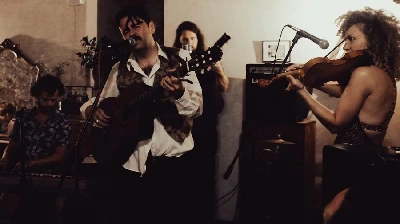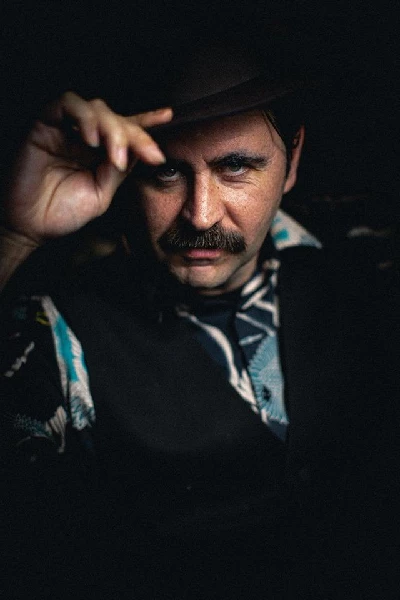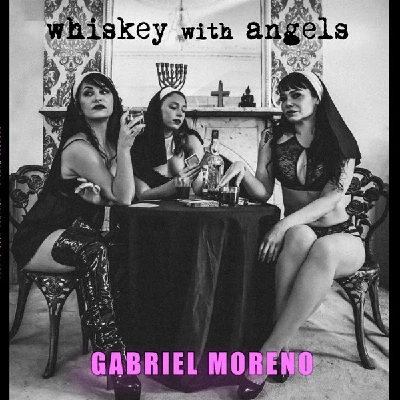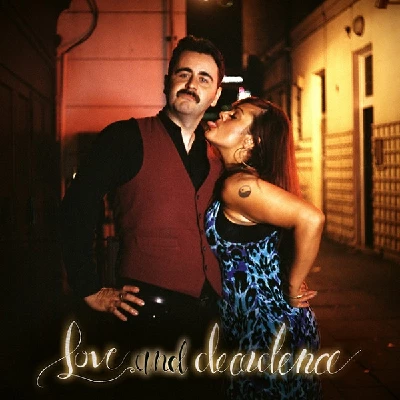published: 7 /
10 /
2021

London-based singer-songwriter and poet Gabriel Moreno muses with Steev Burgess about the relationship between the UK and Gibraltar, learning from other cultures, and the meaning of ‘Duende’.
Article
For those of you not acquainted with the songs of Gabriel Moreno, I believe he is unique in the music world, being someone from the rock of Gibraltar, with its Anglo-Spanish influences in song and poetry.
Think of Lorca, the melancholy of Calexico, Leonard Cohen with a dash of Peter Sarstedt, and you have an idea of the territory Moreno inhabits.
PB: Take us back to your formative years and tell us about your earliest influences in music and poetry?
GM: I think music, lyrics and poetry started to become an obsession for me during the explosion of the Grunge musical movement in the mid-nineties. I was fourteen when Nirvana had become a worldwide phenomenon, Janes Addiction and Faith No More were on the rise, and I was drawn to the rebelliousness of these bands and the idea of the individual and collective catharsis through songs. I started playing in my first bands then, and that period coincided with my discovery of the Spanish poets Lorca and Alberti. I was studying an English syllabus at that time in Gibraltar, and we also touched on T.S Eliot and Emily Dickenson at school and Joseph Conrad. I remember adoring Conrad. From then on, I just wanted to write songs, poems, whatever. Then I heard Leonard Cohen and Fabrizio D'Andre, and I thought to myself, this is what it's about for me.
PB: How did you begin your musical journey that led to London? In one of your new songs, 'Nosediving into the night', you mention many countries. Did you travel elsewhere before settling here?
GM: I studied in England from 1995 to 1999 but travelled to Latin America, Italy, Barcelona, Norway and other countries from 2000 to 2010. After that, I lived in places for no more than a year to absorb the cultural and artistic intricacies of the location. I studied Hispanic poetry and Italian literature in Barcelona and Naples and learned some musical tricks from the Latin singer-songwriters in Chile and Peru. There I was obsessed with their way of portraying socio/political reality through poetical lyrics. Silvio Rodriguez was my idol for years. I met a lady in New York in 2008, and when she moved to London in 2010, I moved to the Great Metropolis with her. This was the first time I took my musical path a little more seriously and started connecting with the Poetry, Americana and Singer-songwriter underground community. I think it was around 2015 that I was lucky to meet you, Steev and other poets and singer-songwriters from the scene.
PB: What were your first impressions on arriving in London, and did it influence your songwriting?
GM: I remember visiting the Lantern Society in 2011 in London and being in awe of the sincerity, complexity, dexterity and uniqueness of the songwriters I came across in the city. I had experienced a lot of musical performances in the underground of many countries. Still, in England, I saw a real tradition of troubadours who were refined in both their sound and their song constructions. I was inspired, belittled and amazed. I decided to work harder to polish my musical performance, my voice and my lyrics. I wanted to improve to the standard of the great acts I encountered. I feel I was challenged and afraid, and that fear and insecurity made me progress as a person and as an artist. I also decided I wanted to write poetry and songs in English because, being from Gibraltar, I felt I wanted to express my Mediterranean psyche with English words. I was happy with that dichotomy. My songwriting in Spanish had never convinced me: it sounded trite and poppy. I much preferred the tensions the Anglo-Saxon linguistic heritage produced in my interiority. I found my preferred form of conflict.
PB: You've just released your third album, 'Whiskey with Angels'. Does it differ from the others in any way?
GM: 'Whiskey with Angels' is a more intimate and personal album. I recorded and produced it by myself with the help of the multi-talented Andrew Harwood, who helped me conform to the aesthetics of the production and recorded some of the bass and second guitar parts. In the past, I had recorded more with a band, The Quivering Poets, and the arrangements had favoured music more than words in most cases. This new album is based around words and the voice. It's basically a monologue with musical embellishments. I am glad it came out at a time when we felt isolated and trapped, as the album is mostly about this longing for otherness and outward connections. There is also a bit more irony and humour than in the other albums. But then again, I might be completely wrong as the creator is seldom objective about her creations.
PB: We share something in common. We've both been said to have an element of Duende in our songs and poetry. Can you explain a little about this largely Spanish phenomenon?
GM: Duende is basically the offshoot of a wound, the spawn of an internal crevice through which, in moments of passion, in instances of cosmic confabulation, in seconds of connection with the deeper layers of the self, inspiration seeps through. This inspiration comes in the form of a new creature, a trickster sort of magical being who pushes through the layers of consciousness and assumes control of the creative direction in performance or creation. The Spanish gypsies called him "Duende" (Gnome or Elf in English). A masculine muse who comes from within and who awakes only in times of excess, pain, and death. "Duende" was used to describe the moments of complete connection with the art and the audience in Flamenco guitar and vocal performances. Still, the great Garcia Lorca extrapolated the idea to any form of performance or creation. It is kind of an Orphic paradigm whereby the artist must hollow his psyche to give space for inspiration or cosmic connection to arise. If you have "Duende" nowadays, it is understood that you abandon your rational self to a more cathartic form of performance. It is high praise for both of us.
PB: The new album seems to be a heady mixture of melancholy and doomed romanticism. How do you see the struggling artists role in these troubled times?
GM: I think these troublesome times are the perfect moment for artists to take a stand in philosophical, political, sociological and aesthetical issues. In times of strife, art has always taken a leading role. It provides a sense of future to a society and a system that seems to be setting itself on fire. The artist, the real artist, is always doomed. She longs for the impossible. She deals with matters she does not understand, but her victory is the will to explore the totality of existence in a time when existence seems meaningless. Any artist in this period considering their music, poetry, painting, sculpture, etcetera exclusively as a money-making, career-pursuing, social-aspirational, self-embellishing exercise is a fraud and completely dispensable. We need artists who want to expand consciousness, want to invent a future when there is none, want a taste of truth no matter how bitter it may be, and are completely devoted to the art itself as a form of tweaking the human experience. Anything else in these complex, dire, existential times is a waste of time.
PB: A few years ago, I noticed a baby in attendance at one of your regular Lantern society gigs. What was it like bringing a new life into the world, and did it influence your outlook and songs?
GM: Angelo Leonard was born in 2018, and though I had completely despised the idea of having children, his arrival to the planet made my existence a million times more bearable. I was amazed at how much I had lied to myself and for so long. The child made me combat my demons daily, and I found it impossible to wear the mask when he was around. I hope that improved my writing too. I was trying to reach the core of the matter and not delude myself into trivialities and falsehoods. As I say, I might be deluded now and have not reached any kind of worthwhile sincerity. Still, his presence makes me want to improve that aspect of myself every day and battle mediocrity to create a more embellished reality for him and those who are waiting to be born into this mad wild world.
PB: You preside over events at The Lantern Society, a folk/acoustic music club in Clerkenwell. Tell us a bit more about it.
GM: I attended the Lantern as a punter first and was so amazed by the quality of the singer-songwriters that became regular performers and listeners to these events run by Jack Day and Benjamin Folke Thomas at that time. People like Dan Raza, Jason McNiff, Joe Wilkes, Simon Stanley Ward, Trent Miller and beacons of the Americana scene were regulars there. Soon enough, we all became mates, and when Ben and Jack decided they wanted to move on, they passed the night to Simon and me. Simon left to bigger things a year later, and I was left with the responsibility of leading it in 2013. Since then, I have been at the helm. Now I run it with Richie Phillips.
PB: What are your plans in music for the immediate future, are there any gigs, radio or touring on the horizon at the moment?
GM: I have a new album called 'The Year Of The Rat' based on experiences of solitude, isolation and poverty, coming out in January 2022. I am working with a Gibraltarian producer called Christian Gadd, and we can't wait to get it out there and start touring. Thank you so much for your questions. All of them are poetical and interesting, as I would have expected from a poet of Duende.
PB: Thank you.
Band Links:-
https://www.gabrielmoreno.co.uk/
https://www.facebook.com/quiveringpoet
https://x.com/loveandecadence
https://www.instagram.com/gabrielangel
Play in YouTube:-
Have a Listen:-
Picture Gallery:-


